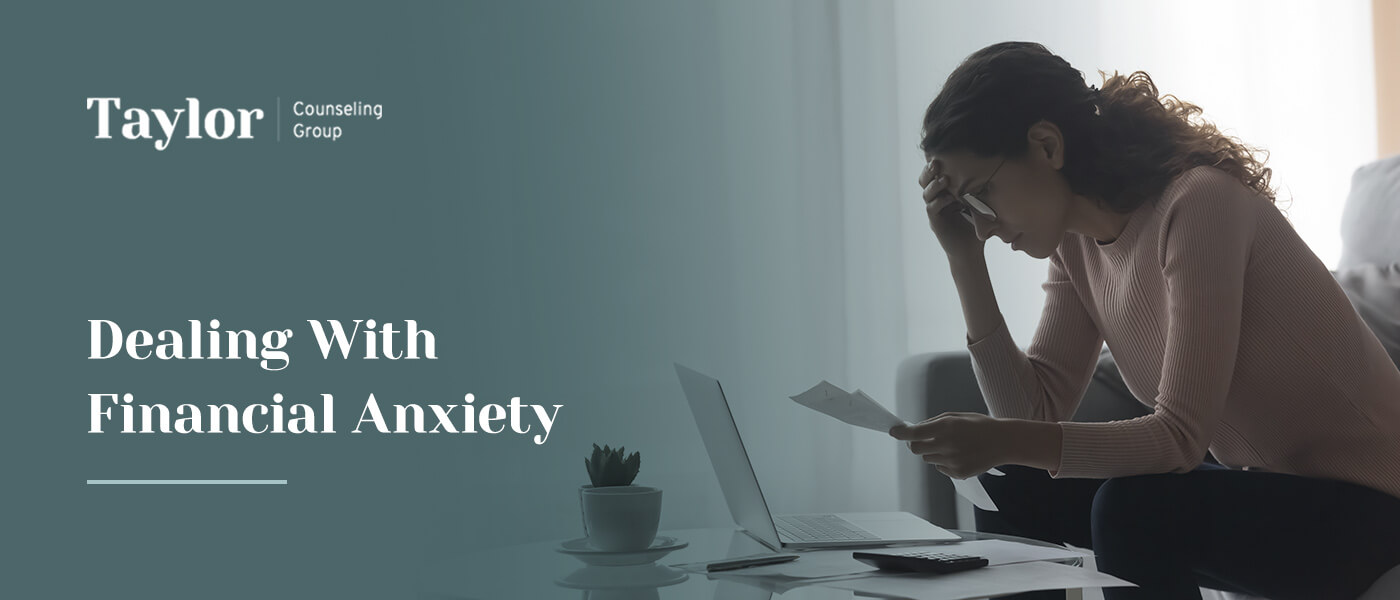Financial anxiety is an intense feeling of worry or unease about money. You may struggle with debt, job loss or mounting expenses and bills. Mental health conditions like depression or a generalized anxiety disorder can also intensify symptoms of financial stress. If you find your financial anxiety is impacting your daily life and causing significant distress, you may wonder where to turn.
Fortunately, financial and mental health professionals can help you relieve financial anxiety and break out of the cycle. Continue reading to learn about the signs of money stress and tips for overcoming it.
- Symptoms of Financial Stress
- How to Overcome Financial Anxiety
- If You’re Struggling With Financial Anxiety, We Can Help
Symptoms of Financial Stress
Financial anxiety can arise for many reasons, though signs that it is becoming a more serious concern include:
- Avoidance: You might avoid paying expenses or even looking at your financial information, leaving bills on the countertop for weeks because you can’t bring yourself to go through them.
- Rumination: Perhaps you can’t stop worrying about your bills or how you’ll save for retirement. You may ruminate on these thoughts several times daily, in bed or at work.
- Analysis paralysis: Even minor expenses might cause you to hesitate as you review the costs of each option.
- No work-life balance: You may feel you must work overtime or dedicate most of your time to stay afloat.
- Rigidity: You might plan your budget down to the penny and get anxious or upset when you must make a minor change.
- Trouble sleeping: Stress and anxiety can make sleeping difficult. You might lie awake worrying about the next unexpected expense or whether you’ll be able to save money for retirement.
- Aches and pains: Financial stress can result in headaches or an upset stomach arising when you look at your bank account.
How to Overcome Financial Anxiety
Financial anxiety can feel overwhelming. Thankfully, there are several ways you can work to ease your symptoms. Knowing you are not alone can also relieve financial anxiety. In the American Psychological Association’s 2022 Stress in America Survey, 66% of adults listed financial issues as a primary source of stress. If you are struggling with financial anxiety, know that this is a common stressor for many, and you can overcome it.
Make a Plan
Whether it’s debt stress, worrying about retirement or losing a job, coming up with a plan to control your finances can help with anxiety. While it’s common to want to avoid the problem, identifying the source of the issue and laying out a plan can be immensely helpful in reducing symptoms.
You might work on overcoming your avoidance to control your finances by:
- Reading finance articles.
- Learning a few new finance terms each day.
- Creating a budget.
- Saving money toward debts.
- Building a financial safety net.
- Automating your savings.
- Visiting your financial goals often.

While everyone’s financial situation is different, you might find the above plans actionable ways to ease your anxiety about money. Educating yourself and believing you can overcome financial stress can be the first step toward feeling better.
Journal
It can help to write about your worries and when you most experience these feelings. Just the simple act of acknowledging your emotions can be the first step to overcoming them. In fact, writing can help reduce stress by combatting negative and intrusive thoughts. Essentially, it’ll help you process and healthily release your negative emotions.
By putting your experiences into perspective, you can concentrate more on the positives. And when you can focus on the positives, you can quell unpleasant anxiety symptoms. Creating a bullet journal can also be an effective way to stay organized. You might list out your financial goals and essential steps you need to take to meet them and brainstorm ideas to keep yourself on track.
Use Relaxation Techniques
All types of anxiety can manifest as both physical and emotional symptoms. The good news is that you can counteract these symptoms by using stress-reducing techniques like meditation, mindfulness and yoga. Studies show the effectiveness of relaxation techniques and how they can help improve many areas of life.
Whether it’s debt stress, unexpected bills or any financial anxiety, these practices might also help you gain a clearer head to face your challenges head-on. Instead of ruminating, you can learn to ground yourself and get started on a healthy plan.
Stick to Your Normal Routine
Another great way to relieve financial anxiety is to stay active. Keep up your daily routine, including visiting friends, updating your resume and paying bills. If you have more time because you’re not at work, try some exercise. Studies show that just five minutes of aerobic exercise can bring anti-anxiety effects, from decreased tension, elevated moods and improved sleep and self-esteem. You might work out at home or search for exercise classes or sports clubs in your area to get started.
Build a Support System
When you need help to overcome financial anxiety, reach out to those closest to you if you’re comfortable with it. Having a support system is vital when you feel anxious or depressed. While it’s common for people to withdraw from friends and family when feeling anxious or sad, opening up might help you feel better. Many people struggle with financial anxiety, and talking about it with friends can help you feel less alone.
Ask for Help
Anxiety can soar when we lack the confidence to face a challenge. If you find your financial anxiety is significantly impacting your life or causing distress, you may benefit from professional financial stress help. Consider reaching out to a mental health or financial planning professional who can provide tips for dealing with financial anxiety and help you make progress tackling your financial challenges.
Many organizations offer free financial counseling to help you get your finances in order. A financial advisor can help you create a budget and give you the tools to stick to it. And if you’re struggling with immense anxiety or pressure due to finances, a therapist can help you cope with these feelings.
If You’re Struggling With Financial Anxiety, We Can Help
When you have anxiety about money, it’s common to feel hopeless or isolated. Remember that you are not alone in your struggles. At Taylor Counseling Group, we can provide help to overcome financial anxiety and regain control over your life. Whether you’re struggling with anxiety, depression or another disorder, our team is highly trained and experienced to provide the care you need.
We also accept most major insurance plans and can work with your budget to provide the highest quality of care. To get started on your mental health journey, schedule an appointment today.






